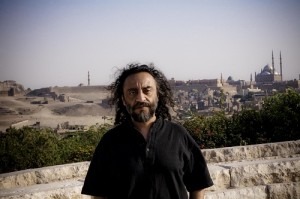Diaa Bekheet | Washington, DC – Fathy Salama, Egypt’s best known jazz musician, Grammy winner, pianist, composer and arranger has also established himself as an influential force in contemporary and traditional Arabic music. When Egyptians revolted against the nearly 30-year rule of President Hosni Mubarak, Salama went into action, writing music for the young poets and singers of the revolution. Concert admission was free or at a nominal fee at Al-Azhar Park’s Genaina Theatre and at the Cairo Opera House, open air theater.
I talked with Fathy Salama about his latest jazz projects and his work for the Egyptian revolution poets. He talked about his jazz/roots music blend, his American experience and his cooperation with international musicians.
[audio:http://www.voanews.com/MediaAssets2/english/2011_09/diaa_bekheet_fathy_salam_jazz_beat_setp2011.mp3]Although jazz is not as popular in Egypt as American pop, Salama is trying to educate the audience. He wants to bridge the gap between modern and traditional music through performances with artists from different countries – among them: Cubana Son, guitar wizard Al Di Meola and other well-known European and American jazz icons.
|
Fathy Salam’s Discography |
Salam’s Compilations |
Fathy Salama was born in Shobra, a city known as the ‘Harlem of Cairo,’ — international star Dalida was also born there. He grew up listening to his family’s favorite traditional music by legends like: Mohamed Abdel Wahab, Farid el Atrash, the Arab Diva Umm Kulthum, or Kawkab Al-Sharq (Planet of the East), profiled here by Egyptian movie star Omar Sharif.
Salama took piano lessons at a very young age and started performing gigs at age 13. He says he listened to a variety of international and traditional music as well as jazz programs by international broadcasters such as the Voice of America (VOA).
In the early 1990s, I profiled Salama on my VOA’s Jazz Club USA show in Arabic, after his group, Sharkiat first became popular. Parts one & two:
[audio:http://www.voanews.com/MediaAssets2/english/2011_09/01_JazzClubUSA-Fathy_Salama_1993.mp3]
[audio:http://www.voanews.com/MediaAssets2/english/2011_09/02_JazzClubUSA-Fathy_Salama_1993.mp3]
Salama studied jazz in Egypt, then, traveled to New York to study with jazz legends Sun Ra, Hal Galper, Malik Osman, Barry Harris and Pat Patrick.
Salama is the only Arab composer to win a Grammy Award. He won the coveted prize for an album he recorded with Senegalese singer Youssou N’Dour. The album has two names “Allah” “Egypt,” and mixes traditions from Senegal and Egypt. Salama has also won the prestigious BBC Music Award, and other prizes for two Egyptian movie soundtracks.
He is currently holding a two-week international music workshop, on the banks of the Nile, sponsored by Mawreds and the Agha Khan Association for Arts. The endeavor involves about 20 musicians from central Asia, including Afghanistan and Azerbaijan. The workshop will end with two concerts bringing together the 20 participant artists. One performance will be held in Aswan, southern Egypt and the other in Cairo.
Fathy Salama’s Sharkiat (Septet) Group:
Percussion: Ayman Sidki
Arabic Percussions: Ramadan Mansoor
Accordion: Salih El Artist
Electric Bass: Amer Barakat
Riq, Tama and Vocal: Wael El Fashn
Guitar: Mohamed Adel
Keyboard, piano: Fathy Salama
Here’s more info on Jazz, Pop and Roots music by Fathy Salam.
Next week, an interview with Mexican-American saxophonist Jessy J.
For more on jazz music, listen to VOA’s Jazz America


